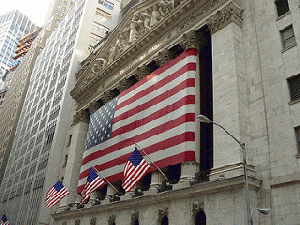Reprinted from Counterpunch
Everyone take a deep breath. This isn't 2007 again. The banks aren't loaded with $10 trillion in "toxic" mortgage-backed securities, the housing market hasn't fallen off a cliff wiping out $8 trillion in home equity, and the world is not on the brink of another excruciating financial meltdown. The reason the markets have been gyrating so furiously for the last couple weeks is because stocks are vastly overpriced, corporate earnings are shrinking, and the Fed is threatening to take away the punch bowl. And to top it all off, a sizable number of investors have more skin in the game than they can afford, so they had to dump shares pronto to rebalance their portfolios.
What does that mean?
It means that a lot of investors are in debt up to their eyeballs, so when the market tumbles they have to sell whatever they can to stay in the game. It's called a "margin call" and on Wednesday we saw a real doozy. Investors dumped everything but the kitchen sink in a frenzied firesale that sent the Dow Jones bunge-jumping 565-points before clawing its way back to a 249-point loss. The reason we know it was a margin call as opposed to a panic selloff is because there was no noticeable rotation into US Treasuries. Typically, when investors think the world is coming to an end, they ditch their stocks and make the so called "flight to safety" into US debt. That didn't happen this time. Benchmark 10-year Treasuries barely budged during the trading day, although they did stay under 2 percent, which suggests that bondholders think the US economy is going to remain in the toilet for the foreseeable future.
But that's another story altogether. The fact is, investors aren't "rotating," they're "liquidating" because they've hawked everything but the family farm and they need to sell something fast to cover their bets. Now if they thought that stocks were going to rebound sometime soon, then they'd try to hang on a bit longer. But the fact that the Fed has stayed on the sidelines not uttering a peep of encouragement has everyone pretty nervous, which is why they're getting out now while they still can.
Capisce?
Here's how CNBC's Rick Santelli summed it up on Wednesday afternoon:
"We basically have a global rolling margin call that's been going on since the 3rd Quarter of last year. It's gotten a bit more intense since the Fed announced it was 'normalizing' because, in essence, a quarter point (rate hike) doesn't mean anything, but the mentality that we are about to turn the corner on the 'Grand Experiment' means a lot." (Closing Bell Exchange, CNBC)
In other words, investors are starting to believe the Fed will continue its rate-hike cycle which will put more downward pressure on stocks, so they're calling it quits now.
Santelli makes a good point about "normalization" too, which means the Fed is going to attempt to lift rates to their normal range of 4 percent. No one expects that to happen mainly because the wailing and gnashing of teeth on Wall Street would be too much to bear. Besides, the Fed just spent the last seven years inflating stock prices with its zero rates and QE. It's certainly not going to burst that bubble now by raising rates and sending equities into freefall. Even so, many investors think the Fed could continue to jack-up rates incrementally to 1 percent or higher. And while that's still below the current rate of inflation, the shifting perception of "easy money" to "tightening" makes a huge difference in investors expectations. And as every economist knows, expectations shape investment decisions. No one is going to load up on stocks if they think things are going to get worse. That's the long-and-short of it.
So is the recent extreme volatility a precursor to "The Big One"?
Probably not, but that doesn't mean that stocks won't drift lower. They probably will, after all, conditions have changed dramatically. We had been in an environment where hefty profits, low rates and ample liquidity were more-or-less guaranteed. That's not the case anymore. Stocks are no longer priced for perfection, in fact, valuations are gradually dipping to a point where they reflect underlying fundamentals. Also, for whatever reason, the Fed seems eager to convince people that the hikes are going to persist. So here's the question: If you take away the punch bowl at the same time that earnings are start to tank, what happens?
Stocks fall, that's what. The only question is "how far"? And since the S&P has more than tripled since it hit its lowest level in March 2009, the bottom could be a long way off, which is why investors are taking more chips off the table.
It's also worth noting that one of the main drivers of stock prices has been AWOL lately. We're talking about stock buybacks, that is, when corporate bosses repurchase their own company's shares to reward shareholders while boosting their "windfall" executive compensation. Here's the scoop from FT Alphaville:
"China is slowing, the oil price is getting hammered, the Fed hiked too soon: all reasons for the ignominious start to the year for the world's stock markets. Here's another bit of meat for the pot, courtesy of Goldman Sachs chief US equity strategist David Kostin: share buybacks.
"One reason for the recent poor market performance is that corporate buybacks are precluded during the month before earnings are released. Any destabilizing macro news that occurs during the blackout window amplifies volatility because the largest source of demand for shares is absent.
(Note: You can view every article as one long page if you sign up as an Advocate Member, or higher).






